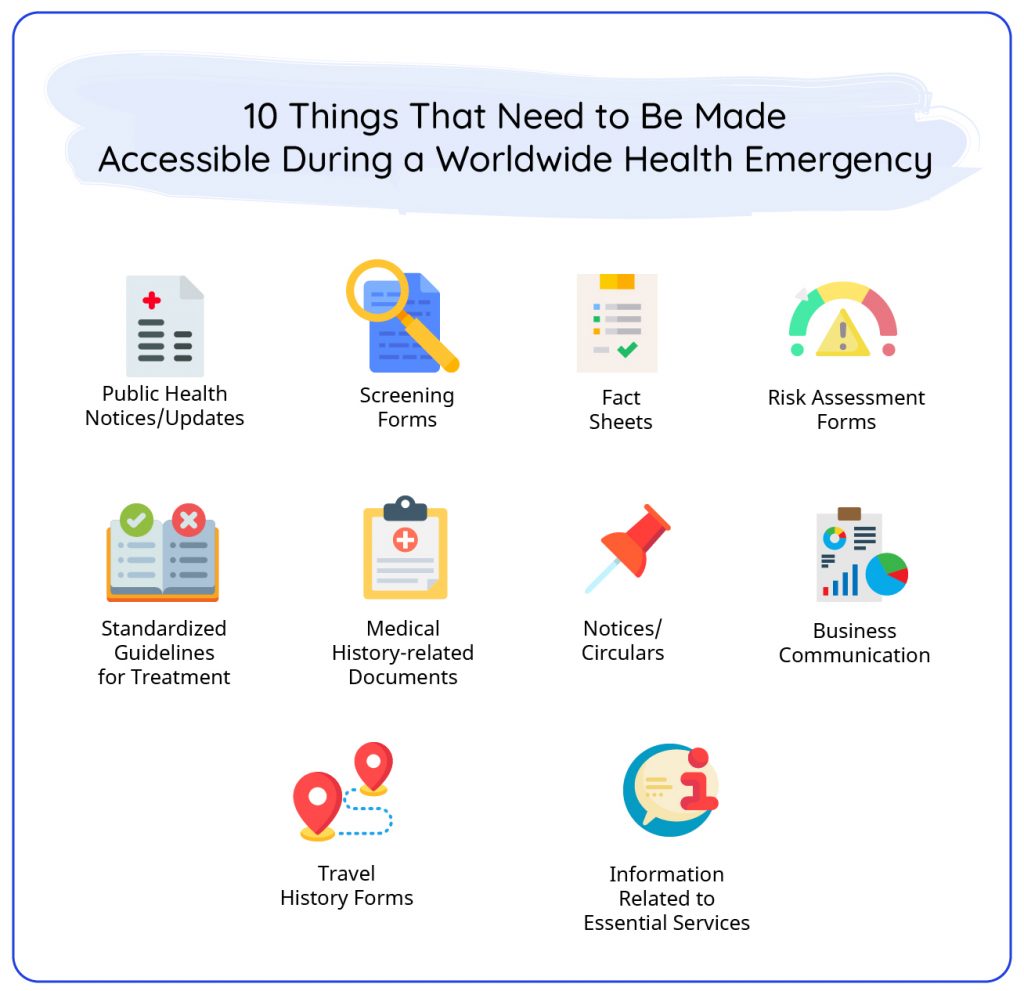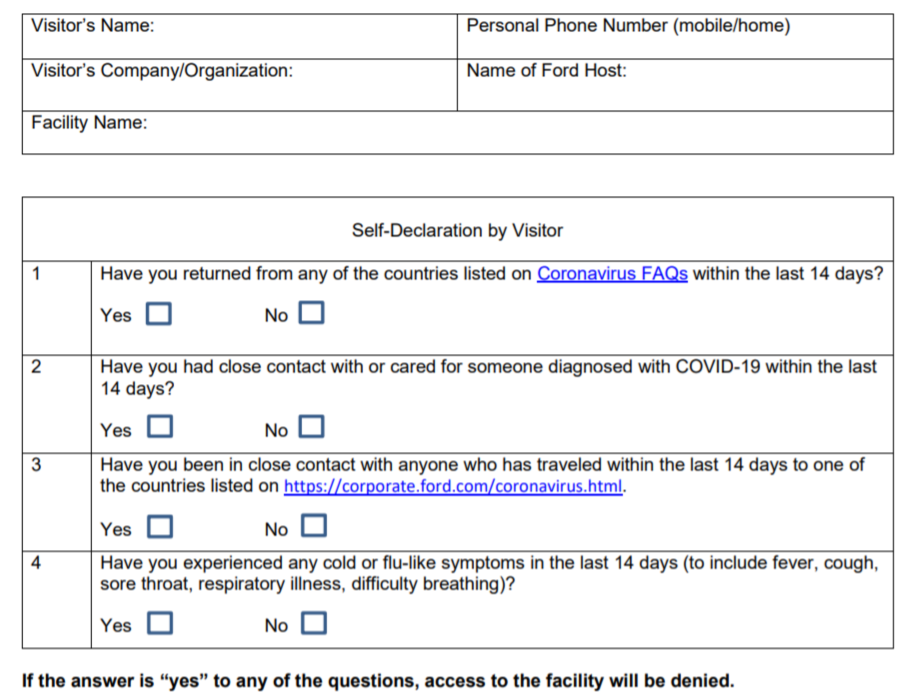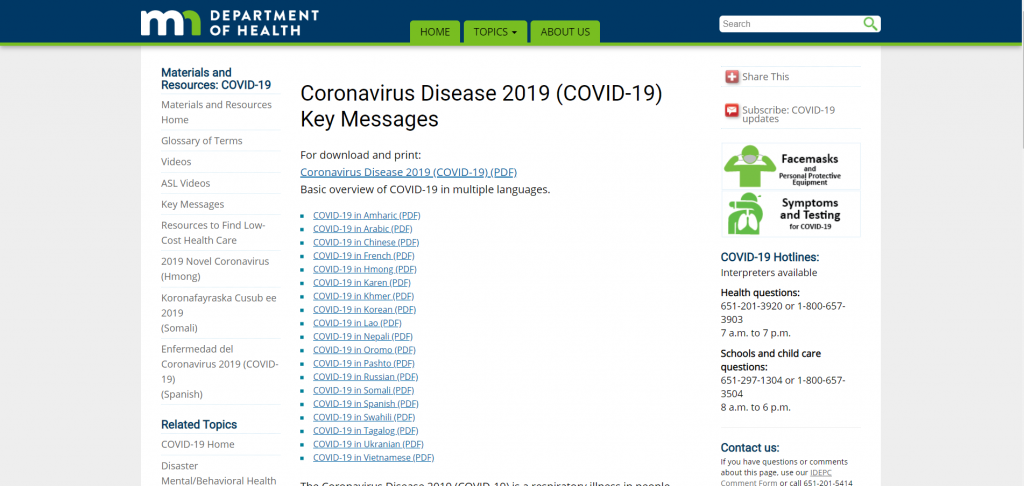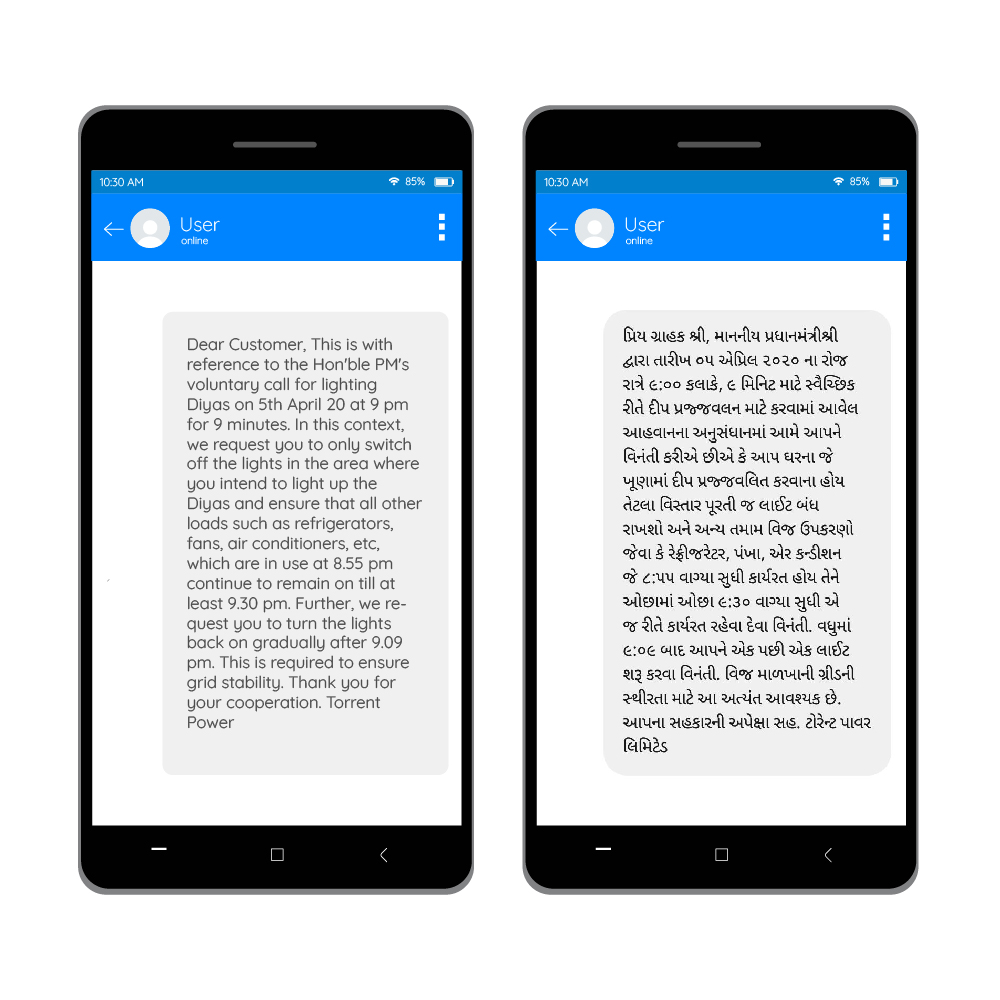Note: Translate By Humans is currently offering complimentary translations for any COVID19-related documents. You can drop a note at support@translatebyhumans.com with the subject line ‘COVID19 Request’ to avail this service.
To find out more about COVID19, visit WHO’s website.
A few weeks ago, my colleague’s parents flew from the USA to India to meet her. They were home quarantined for two weeks to ascertain whether they have any symptoms of COVID19. The local government officials gave them a few leaflets to help them learn more about the preventive measures. However, the leaflets had been printed only in the local language – which only one of them could read.
At first, this may appear like a small problem. However, accessibility to information plays an essential role in preventing and mitigating a worldwide health emergency. Being able to understand accurate and relevant information about a disease can help in the following ways:
It spreads awareness. An epidemic or pandemic causes mass anxiety and panic. Access to information arms people with ways to tackle the situation and gives them a sense of confidence in overcoming it.
It’s inclusive. Providing information in a language that only some communities or groups of people speak puts others in danger. Multilingual information helps reach a wider set of people.
It evokes a better response. Language connects people. When they’re provided with information in their native languages, people are more likely to understand the gravity of the situation, follow the instructions and make more informed decisions.
We, at Translate By Humans, are helping citizens across the world access information with our translation, localisation, subtitling, and interpretation services. In this article, you’ll find a comprehensive list of things that must be made accessible. If you find any information on this list that you’re producing or handling – do reach out to us and we’ll guide you towards making it accessible to more people, for the greater good.

Public health notices, updates
You may have come across creative social media posters and television advertisements that spread awareness about preventive measures for COVID-19. The governing bodies of countries across the world have been using various formats and channels for this communication – social media, television, flyers, pamphlets, Whatsapp messages, texts, etc.
For instance, the government of Kerala – a state in India – posted on social media in Hindi and Bengali, besides the native language of the state – Malayalam. This step helped their message reach a considerable population of migrant workers who are native speakers of Hindi and Bengali.
कोविड -19 प्रभावित क्षेत्रों के लोगों को इन बातों का ध्यान रखना चाहिए।
— CMO Kerala (@CMOKerala) March 13, 2020
করোনা ভাইরাস সংক্রমিত হয়েছে এমন জায়গার মানুষদের যে সকল বিষয় মাথায় রাখতে হবে:
കോവിഡ് 19 ബാധിത പ്രദേശത്ത് നിന്നും എത്തുന്നവര് ശ്രദ്ധിക്കേണ്ട കാര്യങ്ങള്.#COVID19 #coronavirusindia pic.twitter.com/3s1KLThK35
Also, WHO has partnered with WhatsApp and Facebook to provide messaging services in Arabic, English, French, Hindi, Italian, Spanish and Portuguese. This messaging service provides the latest news and information on the Coronavirus – symptoms, preventive measures, etc. Health providers can use it to track the latest situation via reports and numbers in real-time.
Screening forms
People must be vigilant when the world has managed to remove the health threat. That’s when these forms become a necessary formality while travelling or visiting crowded spaces like offices. Say, you are visiting your client’s office for a meeting. The information you provide in this form will help their administration determine whether it is advisable to let you interact with their employees.

The German automobile company Ford uses this declaration letter for people visiting their offices. The questions have been framed to find out if the visitor is susceptible to the COVID-19.
Fact sheets
These sheets give you an overview of how the disease is progressing in different parts of the world. Fact sheets are essential for all the medical researchers working towards treating and curing the disease and the governments determining their country’s next course of action.
The Department of Health, Minnesota, has a list of resources on its website, including COVID-19 fact sheets in 19 languages. These languages also include some less common ones like Tagalog, Pashto, Hmong, Khmer, and Oromo.

In fact, it is essential that all medical research conducted by countries is shared among them, so everyone can increase their knowledge about the disease. Chinese doctors were the first people to share information about COVID-19 with the World Health Organization. Their handbook was originally published in Chinese. Later, they collaborated with the Center for Medical Language Service of Guangdong University of Foreign Languages to ensure the world received this information.
Risk assessment forms for healthcare providers
Risk assessment helps various health service providers in determining the likelihood of a person being infected by a disease:
- Airport and travel authorities use these forms to decide whether a person should travel
- Doctors use them for diagnosing their patients
- Organisers use them to determine if they can hold an event without any health concerns
- Financial institutions like insurance companies use them to determine the health insurance premiums
Check out WHO’s risk assessment form for all those planning to hold an event.
Standardised guidelines for treatment
The World Health Organization (WHO) provides doctors across the world with a set of guidelines to treat epidemics and pandemics. These guidelines include precautions, treatment, medicine dosage instructions, post-treatment care, and patient discharge. A worldwide health emergency calls for all doctors to be on board with the protocols and have accurate and updated information regarding the disease. Translating and localising helps doctors, even the remotest areas of the world, to provide their patients with quality care.
WHO’s website has courses providing real-time training to health professional handling Coronavirus cases. They’ve made these courses available in Arabic, Chinese, English, French, Russian and Spanish to help professionals understand and follow instructions given in their native languages.
Medical history-related documents
In case of an epidemic or pandemic, tourists might be asked to stay put wherever they are. Translated medical history and prescriptions are essential for tourists who find themselves in an unfamiliar place, surrounded by people who speak a foreign language. Having a translated document comes in handy for doctors who are treating tourists.
Notices/Circulars
Every country and state has certain constitutional measures that come into play once an epidemic or pandemic is declared. For instance, the Government of India has enforced the Epidemic Diseases Act, 1897, while the country is trying to tackle the Coronavirus. The act grants the government with special powers to contain the disease.
As part of preparedness to deal with any eventuality arising from #COVID2019, Government has issued Notification as per the Epidemic Disease Act 1897 pic.twitter.com/H8sP0fPjGX
— GujHFWDept (@GujHFWDept) March 14, 2020
The people and the press are notified about such constitutional measures through notices and circulars. However, if these notices and circulars are in the national or local language, it won’t be possible for foreigners to access this information.
Business communication
A worldwide health crisis affects everything, including the economy and travel. So, businesses must continue communicating with their clients, customers, shareholders, and employees – globally. This communication could be in the form of an email, video, printed material (for internal communication) or an audio file.
Global communication would require you to convey your message in the native language of all your associates. Translating, localising, and subtitling your message will also build trust in your professional relationships.
Check out how one of our clients, Bondora, released a video of their CEO talking about COVID-19 and how their company aims to ‘stay on track’ during this critical time. The video’s audio is in English, and the subtitles are in Estonian.
Information related to essential services
The continuance and maintenance of essential services like food, electricity, financial services, medicines and water are necessary for people to survive in any health emergency. Consequently, providers try to keep an open channel of communication with their customers by sending them texts, emails, etc. For instance, a grocery store might want to let their customers know about the ‘open’ hours, delivery timings, and the availability of goods. These messages, when translated and localised, will reach and inform everyone.
A few weeks ago, India’s Prime Minister Narendra Modi appealed to citizens to turn off the lights in their homes and ignite candles and oil lamps at their doorsteps or balconies as a display of the citizens’ solidarity in the face of COVID-19. Everyone feared that the blackout would cause grid imbalance. Torrent Power, the primary electricity provider in Ahmedabad, Gujarat, sent out a text to concerned citizens (in English and local languages) giving them instructions about implementing the blackout.

Travel history forms
Often during an epidemic or a pandemic, the WHO warns the world about ‘red’ zones – certain countries or areas where the disease is spreading quickly. This way, travel officials, including airport authorities, can flag travellers coming from such areas and alert the governing bodies.
Authorities use travel history forms to determine whether it’s safe for a person to travel. Naturally, making these forms available in multiple languages will help travellers in providing accurate information.
In his address to the nation, PM @narendramodi urged every citizen to download the #AarogyaSetu app, which will play a key role in containing the spread of #Coronavirus infection in India. #IndiaFightsCorona
— Aarogya Setu (@SetuAarogya) April 14, 2020
Download today: https://t.co/siqZVqSIBC pic.twitter.com/9oW71Ap7gC
Presently, people are finding solutions to get live travel history information. For instance, the Indian government has launched the ‘Aarogya Setu’ tracking app available in 11 regional languages, which will provide information that will help in determining whether you have been near a COVID-19 patient. The app uses your phone’s GPS and Bluetooth to get this information. This proves to be a solution for live travel history tracking.
Conclusion
On the topic of COVID-19, the United Nations says, “Governments everywhere are obligated under human rights law to provide reliable information in accessible formats to all, with particular focus on ensuring access to information by those with limited internet access or where disability makes access challenging.”
Making critical information available in various languages and formats provides people across the world – with a weapon – to fight through and survive a health emergency.



